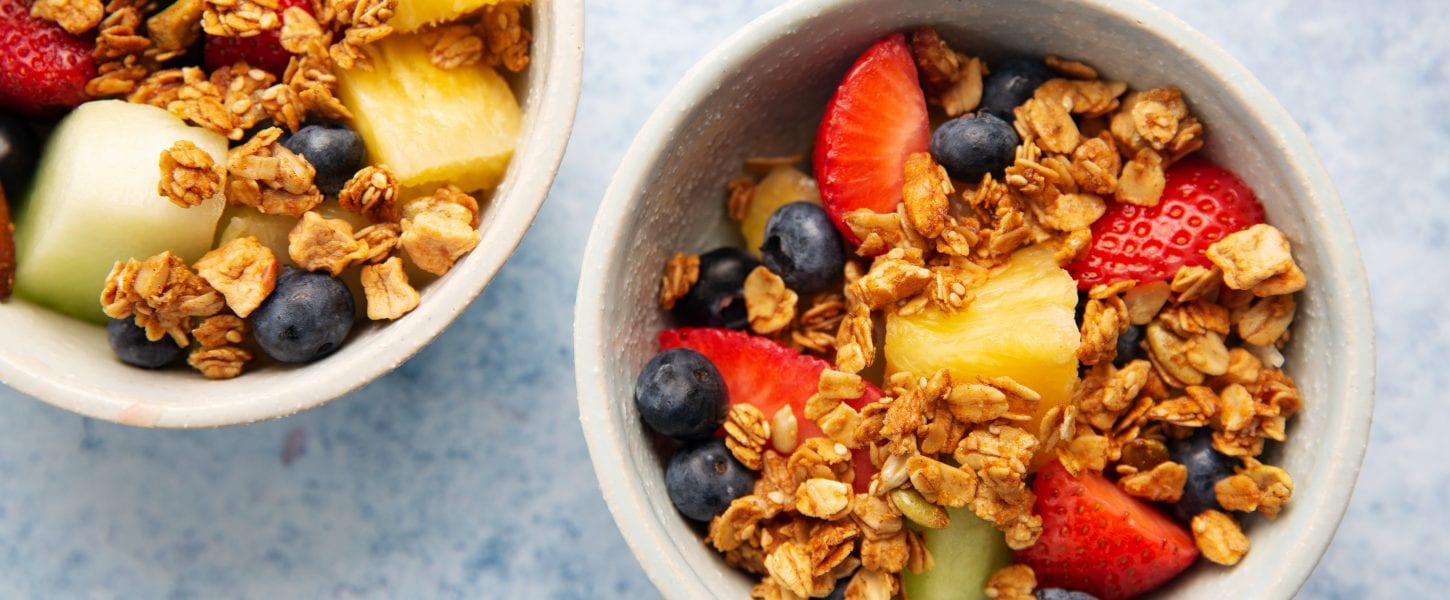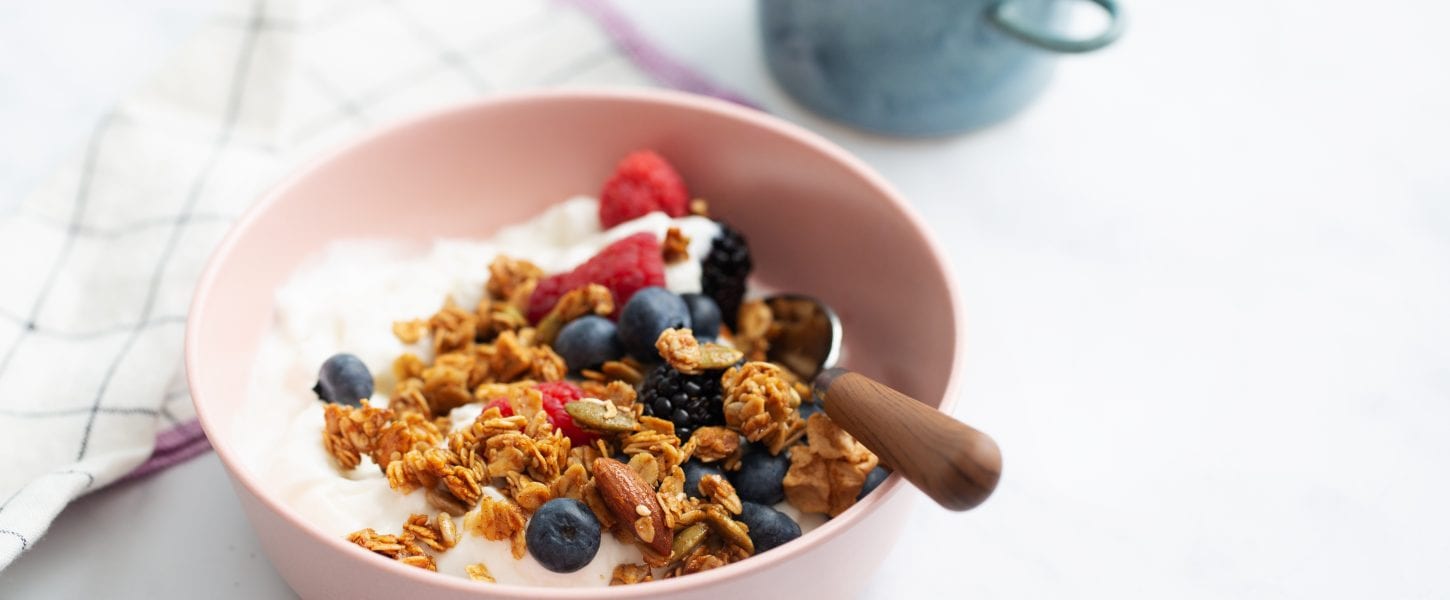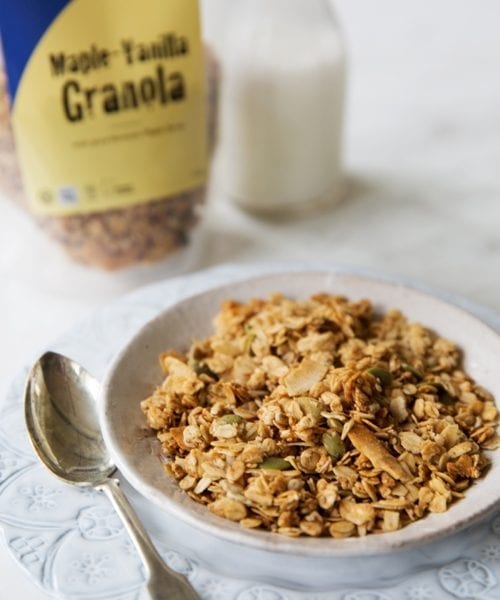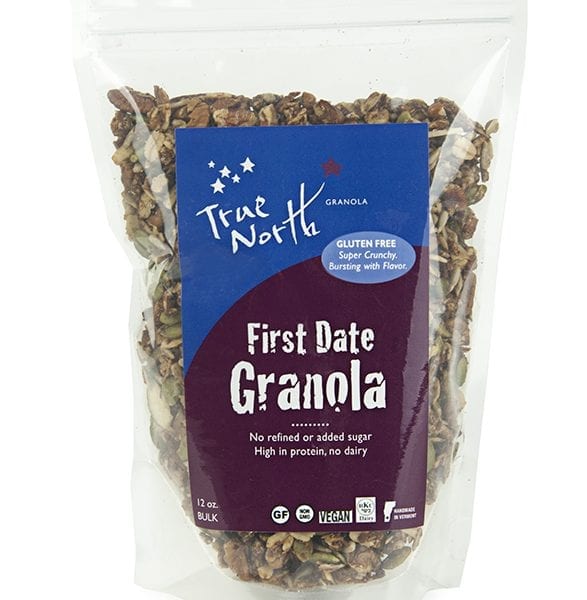Granola is a popular breakfast option because it’s convenient, delicious and (in some cases) packed with nutritious ingredients. But if you’re managing diabetes, it’s crucial to understand how foods like granola affect your blood sugar levels. So, is granola good for diabetics?

The short answer is: it depends. Granola is typically made from rolled oats, nuts, and some kind of sweetener. Many granola varieties also include ingredients like dried fruit, seeds; spices and other flavorings. While these ingredients can offer a lot of vitamins, minerals and antioxidants, many conventional granola brands are also high in carbs and sugars, which may impact your glucose levels.
Analyzing the nutritional content and health benefits of granola is important when determining how it may fit into your diabetic diet.
Some granola varieties come loaded with added sugars and high-glycemic ingredients that could cause a spike in your blood glucose. On the other hand, granola can also be a good source of dietary fiber, which has a more gradual effect on blood sugar.
Finding granolas with fewer added sugars and higher fiber content can be beneficial for maintaining stable blood sugar levels.
Looking for the best granola for diabetics? Keep reading to learn more about diabetes and what to look for in a healthy granola brand.
Understanding Diabetes
Diabetes is a chronic condition that affects how your body turns food into energy. The main factor involved is blood sugar regulation. Managing this condition requires an understanding of the different types of diabetes and how they influence your insulin levels.
Types of Diabetes
There are primarily two types of diabetes that you might encounter.
Type 1 diabetes is an autoimmune condition where the pancreas produces very little or no insulin. It’s typically diagnosed in children and young adults. Conversely, with Type 2 diabetes, your body either resists the effects of insulin—a hormone that regulates the movement of sugar into your cells—or doesn’t produce enough insulin to maintain normal glucose levels.
There’s also gestational diabetes, which occurs during pregnancy, and prediabetes, which is when your blood sugar levels are high but not high enough to be considered Type 2 diabetes.
- Type 1 Diabetes: Autoimmune, little/no insulin produced.
- Type 2 Diabetes: Insulin resistance or insufficient production.
- Prediabetes: Higher than normal blood sugar levels, not yet Type 2.
- Gestational Diabetes: Appears during pregnancy.
Blood Sugar Regulation
Regulating blood sugar is crucial for managing diabetes. When you eat, carbohydrates are broken down into glucose (sugar), which enters your bloodstream. This increase in blood sugar signals your pancreas to release insulin. Insulin acts as a key, allowing glucose to enter your body’s cells for use as energy. If you have diabetes, this process doesn’t work properly.
- High Blood Sugar (Hyperglycemia): Can cause serious health issues over time if not managed effectively.
- Low Blood Sugar (Hypoglycemia): Often a side effect of diabetes medications, can be dangerous if severe.
Maintaining balanced blood sugar levels is a delicate process, and if you have diabetes, you need to monitor your blood sugar closely to ensure it’s within a healthy range. Part of managing diabetes is paying close attention to the ingredients and nutritional profile of the foods you eat.

The Nutritional Profile of Granola
Your understanding of granola’s nutritional profile is crucial when considering it as part of a diabetic diet.
Common Ingredients in Granola
Oats: A fundamental component of granola, oats are a source of whole grains that provide you with complex carbohydrates and fiber, vital for blood sugar management. A typical serving of granola can contain between 3 to 5 grams of fiber, which helps slow digestion and prevent spikes in your blood sugar levels.
Nuts and Seeds: These are commonly used in granola and are excellent sources of protein and healthy fats. Nuts like almonds, walnuts, and pecans, along with seeds such as pumpkin, flax, or chia, contribute to the calories in granola but offer satiety and nutrients important for heart health.
Dried Fruit: Often added for flavor and sweetness, dried fruit can increase the sugar content of granola. It’s essential to pay attention to the type and quantity of dried fruit in granola to manage your intake of added sugar. Look for granola made with naturally-sweetened dried fruit. At True North Granola,for example, our dried fruits are infused with apple juice and sunflower oil, with no refined sugar added.
Added Sugar and Sweeteners: Many granola brands add sugar or sweeteners to enhance taste, which can significantly increase the calories and potential glycemic impact. Be vigilant for terms like cane sugar, honey, or high-fructose corn syrup on ingredient lists and consider options that use minimal added sugars or lower glycemic alternatives.
At True North, for example, our granola is sweetened with pure maple syrup, a slight amount of Demerara sugar and organic date powder. While all of our granolas have lower sugar than many conventional granola brands, our “First Date” Low-Sugar Granola contains no refined sugars and is sweetened only with dates. You wouldn’t know that organic pulverized dates are the sweetener in this granola type which contains less than one gram of sugar!
Glycemic Index and Blood Sugar Control
When managing diabetes, understanding the glycemic index (GI) of foods is crucial to controlling your blood sugar levels. The GI measures how quickly a food causes your blood sugar to rise, with high-GI foods potentially leading to faster and higher blood sugar spikes.
Effects of High-Glycemic Foods
Eating foods with a high glycemic index can lead to rapid increases in blood sugar levels. This is particularly challenging for you if you have diabetes, as your body may not be able to regulate these spikes effectively.
Consuming high-GI foods like some types of granola, which may be high in sugars and refined carbohydrates, could cause your blood sugar to rise quickly. This is why many conventional granola brands may not be good for people with diabetes in most cases.
Choosing Low-Glycemic Options
Selecting low-GI foods, such as certain whole grains and granola made with fiber-rich ingredients, can help maintain steady blood sugar levels. Look for granola that includes nuts, seeds, and low-sugar or sugar-free sweeteners to lower the overall GI.
Balancing granola with protein-rich foods can also aid in blood sugar management, ensuring a slower release of glucose into your bloodstream. Pairing True North Granola with plain Greek yogurt is a great option!
Health Benefits of Granola
When incorporating granola into your diet, it’s crucial to weigh its nutritional benefits against its risks, especially if you’re managing diabetes. Here are a few of the health benefits of granola:
Packed with Fiber, Fat and Antioxidants
Granola can be a nutritious addition to your diet when chosen carefully. It’s a food often packed with whole foods like rolled oats, nuts, and seeds, which contribute to its content of fiber, healthy fats, and antioxidants.
Support for Key Body Functions
These elements offer various health benefits. For example, a high fiber content can assist in maintaining a healthy digestive system and can contribute to cholesterol management. Foods rich in antioxidants can help prevent heart disease and some types of cancer by protecting your cells from damage.
Blood Sugar Regulation
Consuming granola may have a positive effect on blood sugar regulation due to its fiber content. Fiber slows down the digestion of carbohydrates and the absorption of sugar, which can prevent blood sugar spikes after meals. However, this is dependent on the granola being low in added sugars and high in whole grains and other ingredients that have a low glycemic index.
Helps Manage High Blood Sugar
Oats are surprisingly rich in manganese, which plays a role in regulating blood sugar by stimulating or inhibiting insulin release. This is a great health benefit, especially for anyone managing diabetes.
Granola that uses natural sweeteners instead of refined sugars can also help manage diabetes while enjoying a sweet bite every once in a while. At True North Granola, our First Date granola variety, for example, is sweetened with date powder.
How to Incorporate Granola Into a Diabetic Diet
Managing your diet is crucial for controlling blood sugar levels and maintaining overall health. It’s possible to eat granola on a diabetic diet, but it’s important to choose the healthiest granola brand possible.
Choose granolas that are whole-grain, less processed, and don’t contain added sugars. Instead, look for ones that are sweetened with alternatives like natural fruit, fruit juice or date powder.
Remember that granola’s nutritional value can be highly variable. A granola that is rich in protein, fat and fiber can be beneficial for managing diabetes. These help slow down the absorption of glucose and can keep you full longer.
When you do eat granola, try pairing it with protein-rich foods or foods that are low GI. Pairing granola with plain Greek yogurt is a great option, but you can also use it for an added crunch on vegetables, as a breading for chicken or as a standalone snack.
Portion Control
One important reminder: granola is calorie-dense, so you must pay close attention to your serving size. An appropriate serving size may be smaller than you think — typically around 1/4 to 1/3 of a cup. Measuring your portions can prevent unintentional overeating which could lead to weight gain or higher blood sugar levels.

What Is the Best Granola for Diabetics?
The best granola is low in sugar, high in fiber, high in protein and packed with nutrient-dense ingredients.
First Date Diabetic-Friendly Granola by True North Granola
First Date Granola has no added refined sugar and is vegan, gluten-free and higher in protein than most of our other granola.
We use organic date powder for the perfect touch of sweetness that won’t lead to major blood sugar spikes. Date powder is made from pulverized dried dates, an all-natural fruit. This variety includes more nuts than oats, so it’s lower carb and still packed with healthy ingredients.





